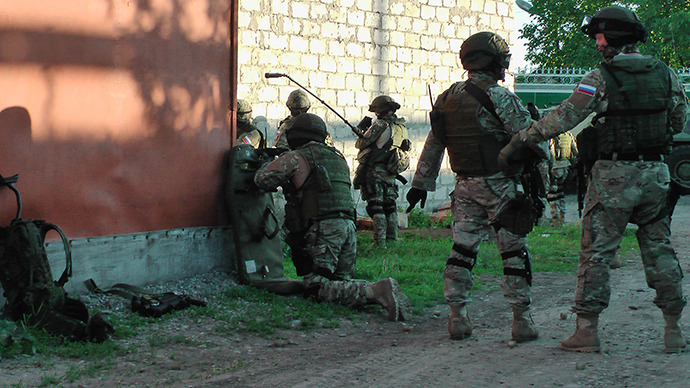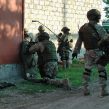
Redeployment of Russian Forces to Ukraine Leads to Drop in Violence in North Caucasus
Publication: Eurasia Daily Monitor Volume: 12 Issue: 8
By:

Despite a noticeable decline in the intensity of violence in the North Caucasus, Russian experts on the region are convinced the situation is set to become worse rather than improve. The Kavkazsky Uzel website estimated that 290 people died and 144 people were injured in the conflict in the North Caucasus during January–November 2014. Fifty of the victims were civilians, of whom 34 died and 16 were injured. Out of the total number of victims, 167 were government servicemen, of whom 41 died and 126 were injured. The remaining 217 casualties were among the militants, of whom 215 died and two were injured (Kavkazsky Uzel, December 4, 2014). The contrast between 2014 and 2013 is quite telling: in 2013, more than 500 people were killed and more than 400 injured (Kavkazsky Uzel, January 27, 2015).
Russian experts interviewed by the news agency Kavkazsky Uzel said that many signs indicate the situation in the North Caucasus is unlikely to improve in 2015. The well-known North Caucasus expert from the Memorial Human Rights Center, Alexander Cherkasov, confirmed that the numbers of casualties have decreased in the North Caucasus since 2012. However, he said that in the republics where the government relies exclusively on crude force, such as Chechnya, the rebels are more likely to revive. Cherkasov cited Ingushetia as a region where the government achieved stability through using a “soft approach.” The expert said that the outflow of hundreds of militants from the North Caucasus to Syria helped pacify the region, but their return and the increasing number of them who are pledging allegiance to the Islamic State would pose a serious threat for the future of the region (Kavkazsky Uzel, January 7, 2015). At the end of 2014, the North Caucasus militants, one by one, started pledging allegiance to the Islamic State, effectively splitting the Caucasus Emirate, since the leadership of the insurgency in the North Caucasus opposes the self-styled caliphate (see EDM, January 8, 2015).
Varvara Pakhomenko of the International Crisis Group added that another factor that helped lower the intensity of conflict in the North Caucasus were the extremely tough methods of pressure used in the run-up to the Sochi Olympics on all individuals in the region engaged in Islamic activities. Many were either killed, arrested, forced to leave the region or even to emigrate, according to Pakhomenko. In the short run, this had a pacifying effect, she said, but this approach is unlikely to work in the long run (Kavkazsky Uzel, January 7, 2015).
Another important factor that may contribute to a worsening of the security situation in the North Caucasus is Moscow’s focus on the stealth war with Ukraine. A large part of the Russian forces that were dispatched to eastern Ukraine came from the North Caucasus (see EDM, September 8, 2014). However, economist Denis Sokolov regards the outflow of Russian forces from the North Caucasus as a factor reducing the conflict in the region. According to Sokolov, the “old system” of the armed resistance perished in 2014 and a “new system” is forming to replace it. In his view, the developments in Russia, the Syrian war and other circumstances will affect what the “new system” will be like. At the same time, Tatyana Lokshina of Human Rights Watch and Sergei Nikitin of Amnesty International say that last year was unprecedented in terms of human rights violations in the North Caucasus (Kavkazsky Uzel, January 7, 2015). This, they say, may make it possible for the insurgency to capitalize on the grievances of the local population.
As Russia heads toward an economic crisis and Moscow continues its hybrid war in Ukraine, the North Caucasus seems likely to remain violent. In fact, Russian involvement in the Ukrainian crisis may make it even harder for Moscow to retain control over the North Caucasus given reports of its redeployment of forces. Besides the obvious issue of having to divert resources away from the North Caucasus to Ukraine, shifts in public opinion may matter as well. While for some ethnic Russians, the war in Ukraine is a Russian national struggle for Greater Russia and the Russian World (Russky Mir), for many North Caucasians, fighting and suffering economically for the Russian World is a less-than-inspiring enterprise. This means that the Ukrainian crisis and the economic downturn connected to it will heighten tensions between North Caucasians and Russians rather than cause a rally-around-the-flag effect. More precisely, while ethnic Russians may still rally around the flag, non-Russian North Caucasians will feel alienated, and this disparity will contribute to the increasingly divergent paths of the North Caucasus and the rest of the Russian Federation, particularly if Moscow becomes bogged down in a protracted conflict with Ukraine.




